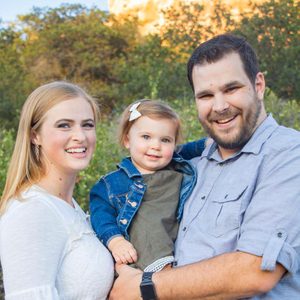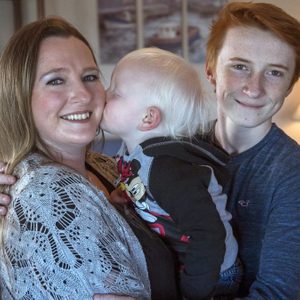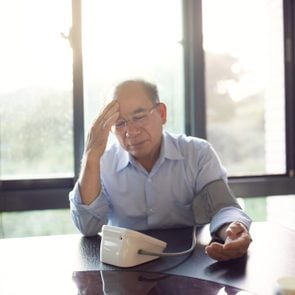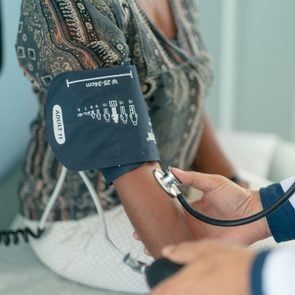I Had Dangerously High Pressure in My 30s and It Almost Killed Me
Updated: Oct. 10, 2022
This woman's dangerously high blood pressure led to a hypertensive crisis and she almost had a heart attack before age 40. Here's how she changed her life to get better.
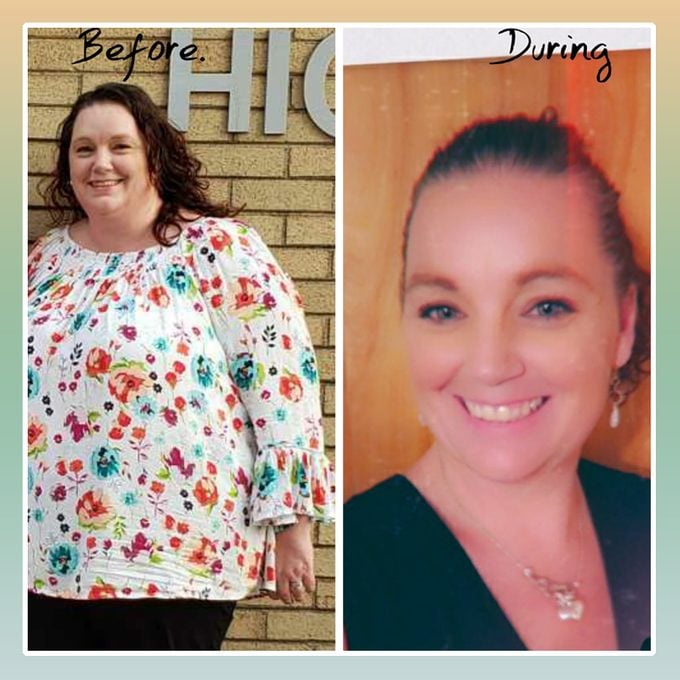
High blood pressure rarely causes symptoms. It’s not something you can feel. But it can have serious health consequences, which is why many experts have dubbed it a “silent killer.” The only way to diagnose high blood pressure (or hypertension) is by getting your blood pressure checked at regular doctor visits.
When Sandra Crawley went in for a check-up in 2015, it had been a few years since she’d seen a physician. Faced with the surprise of dangerously high blood pressure, she began a long and difficult journey to becoming the strongest and healthiest version of herself.
Triple digits over triple digits
I hadn’t been to my ob-gyn (my only doctor at the time) in two years. And I hadn’t seen a primary care physician in probably 10 years. So as I sat on the examination table and the nurse read my blood pressure aloud—198/117, which amounted to a hypertensive crisis, when blood pressure is extremely high with no symptoms—I was shocked. I wasn’t as alarmed as my doctor. And probably not as alarmed as I should have been.
At the time, I chalked it up to being stressed and sick. I was raising four children. And, after putting myself through nursing school (graduating in the top 10 of my class), I was starting a whole new career. My health and weight were not top priorities for me—work and my family were.
Nonetheless, triple digits over triple digits is never a good thing to see. My doctor started me on medication and strongly advised that I lose weight and exercise more.
This should have been a wake-up call. I had lost aunts, uncles, and grandparents because of massive heart attacks, complications from open-heart surgeries, and strokes. My own father has had multiple hospital stays due to heart health issues. And that was my fear: That I would have to leave my children when they were young because of a heart attack.
Not taking things seriously
As any nurse will tell you, we make the worst patients. I took my pills and went on with my life, haphazardly trying to lose weight with no success. I tried things like the Couch to 5K training plan to get into running. But I was always too tired and stressed to stick with it. When I started getting headaches, I assumed they were due to my busy lifestyle.
A heart attack scare
After about three months, my body said enough was enough. In the middle of a particularly busy day at work, I was fighting a horrible migraine and was so exhausted that I felt out of breath. Multiple co-workers asked how I was feeling, saying that I just didn’t look right.
I responded that I was just tired. But by the end of the day, the seasoned nurses in my unit were urging me to go to the ER and get checked out. I was fine, I told them; I just needed to go home and rest. It was exhaustion, nothing more. Little did I know, that’s one of the silent signs of a heart attack.
On my hour-long drive home, I turned on my seat warmer to relax, when suddenly I felt my back, neck, and left arm tense up. I was about two miles from home when the nausea hit and I started dry heaving. As I made a mental list of my symptoms, the truth finally hit me: I might be having a heart attack.
Rushing to the hospital
I live in a small town and I have to pass the fire station on my way home; it’s about four blocks from my house. So I decided to stop and have the EMTs take my blood pressure. I figured if it was high, I’d go home and have my husband drive me to the hospital. They checked my vitals and told me they would be taking me to the hospital, flashing lights and all. My blood pressure was dangerously high and I was showing classic signs of a heart attack.
Although I don’t remember what the specific numbers were—just that they were again triple digits over triple digits—I do remember the look of worry on my EMT friend’s face as he took my blood pressure and told me the news.
The cardiac unit
I ended up in the hospital on the cardiac unit for five days. During that stay, I had an episode of respiratory arrest (when you start breathing inefficiently or stop breathing altogether), plus a multitude of tests, IV medications, and consultations with different doctors. In the end, they ruled out a heart attack. But they found that I had left ventricle hypertrophy (in which my heart’s left pumping chamber was overworked and not pumping blood efficiently) and an arrhythmia (an irregular heart rhythm).
A sensitivity to heart medications
I was also struggling with shortness of breath and lightheadedness. Every time I tried to walk around the unit my oxygen levels would dip and I had to stop. I thought it might be because of my medications. But the doctor refused to listen.
“If you would get more exercise this wouldn’t happen,” he told me. “Maybe try getting out of bed.” I lost it, bawling. I hadn’t made many gains, but I had been trying with my exercise. I implored him to look past my weight and figure out why I was feeling this way instead of judging me. But he still didn’t listen.
Three days after being discharged from the hospital I went to see my primary care doctor. I told her what was going on and that I still thought my medications were the problem. She finally agreed and switched my medications. Three days later I was feeling better. Turned out, I was incredibly sensitive to heart medications.
Finally, a wake-up call
Hearing that my blood pressure, weight, eating habits, and lack of exercise were physically changing my heart wasn’t surprising. But the ultimate wake-up call was the scare of having a heart attack before age 40. I could have left my young children without a mom and I was doing it to myself. I didn’t want to die or suffer through heart disease like my parents and grandparents. It was now or never.
I started taking dieting seriously and going to the gym daily for hours at a time. I splurged on a personal trainer, telling myself that the money I spent would either be for a trainer or a funeral. I pushed myself hard and within a year, I’d lost 80 pounds and completed my first half marathon. Things were finally changing for the better.
Dizziness, lightheadedness, and passing out
But I didn’t listen to my body. I overworked it and stressed it too much. I had learned to love running. But my body and my heart were not healthy enough to do what I wanted them to do.
After finishing that first half marathon, I tried to run a 5K, but was so winded after a mile that I had to stop. The running seemed so much harder than it had in the past.
Shortly after, I tried to go out on one of my favorite short runs. About a half-mile in, I began walking because I was feeling dizzy and lightheaded. Then my legs felt like they were going to give out so I had to sit down on the side of the road until the feeling passed. Two days later, while talking with my husband, I passed out.
Random episodes of dizziness, lightheadedness, and passing out started to occur. I returned to the doctor and was tested for epilepsy, pulmonary diseases, and neurological issues. None of those seemed to be the problem and they determined that I had just pushed way too hard, way too fast and my heart wasn’t healthy or strong enough for such a dramatic shift. The episodes were signs that my heart was being strained beyond a healthy level. I had to take six weeks off from work because I wasn’t able to do much of anything.
Dealing with panic attacks and anxiety
Unable to even work, I started to become afraid of exercising. Even after I was cleared to go back to my normal activity, I was terrified. What if I had another episode while I was out running by myself? What if I fell and injured myself? I started having panic attacks and my anxiety skyrocketed. (Here’s how anxiety can influence high blood pressure.)
After a few months, I was back to my old ways of not doing anything. My weight and blood pressure both started creeping back up to their past levels. My son graduated from the eighth grade, and when I saw the photo we’d taken, I was looking at a woman who was bigger than I’d ever been.
Deciding to get surgery
Five years after beginning my battle on my own, I decided I needed help. I started researching bariatric surgery and attended a seminar a few months later. I knew my goals and my mindset were in the right place: I didn’t want to be skinny, I wanted to be healthy.
I wanted to be able to finish a second half marathon in a healthier fashion than my first one. And I believed that surgery could be a tool to help me get there.
In March of 2020, I had bariatric surgery, specifically the gastric sleeve procedure, which reduces the stomach.
This wasn’t an easy fix. I still struggle with food choices and portion sizes. I still have to wake up and put on my running shoes and train safely.
But at my doctor’s appointment in June, I presented the blood pressure logs I’d been keeping since my surgery. And I had enough normal readings without spikes that my doctor agreed to take me off medication.
Life after surgery
Today, I’m down over 120 pounds. My baseline blood pressure is down in a very normal and healthy range, as is my resting heart rate. I’ve learned to listen to my body and how I’m doing physically, emotionally, and mentally.
I exercise hard but also work in rest days to allow my body to heal. I’ve even had the energy to take on new projects, like as a medical consultant for the motherhood site Mom Loves Best.
Now when I’m out running, I feel stronger and healthier than I’ve ever been. I know that I’m becoming the best version of myself because my children, grandchildren, and I deserve the best version of me.
—As told to Alyssa Sybertz


